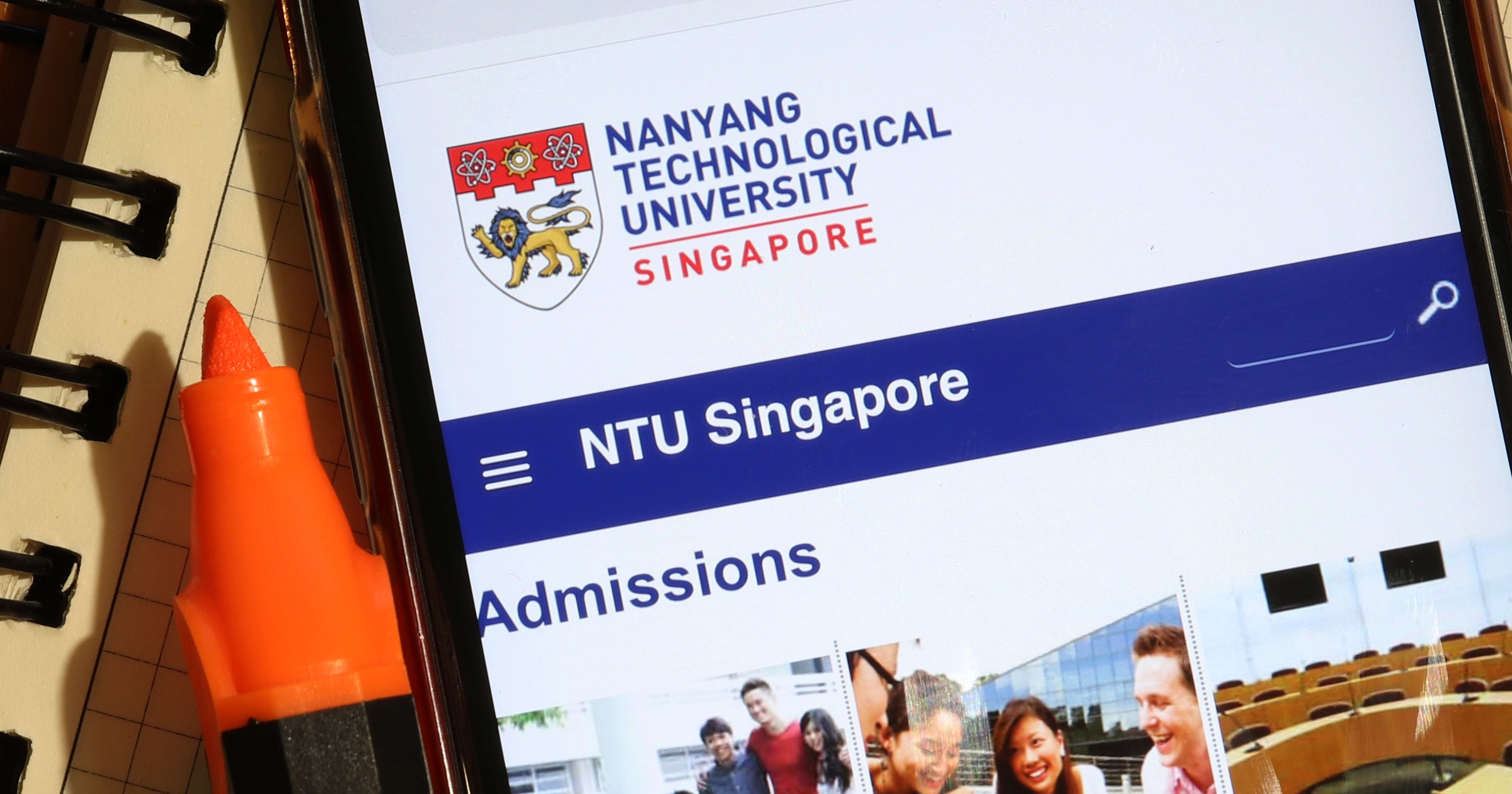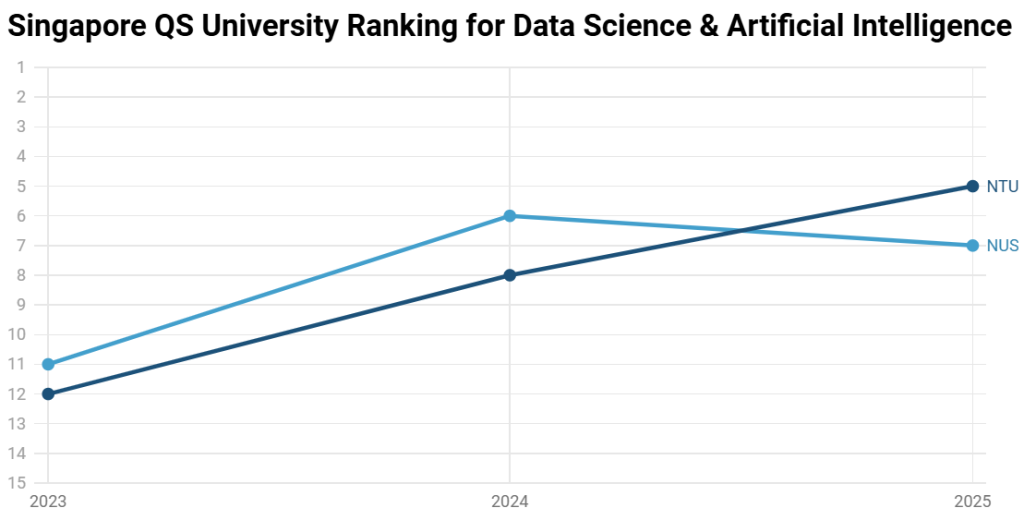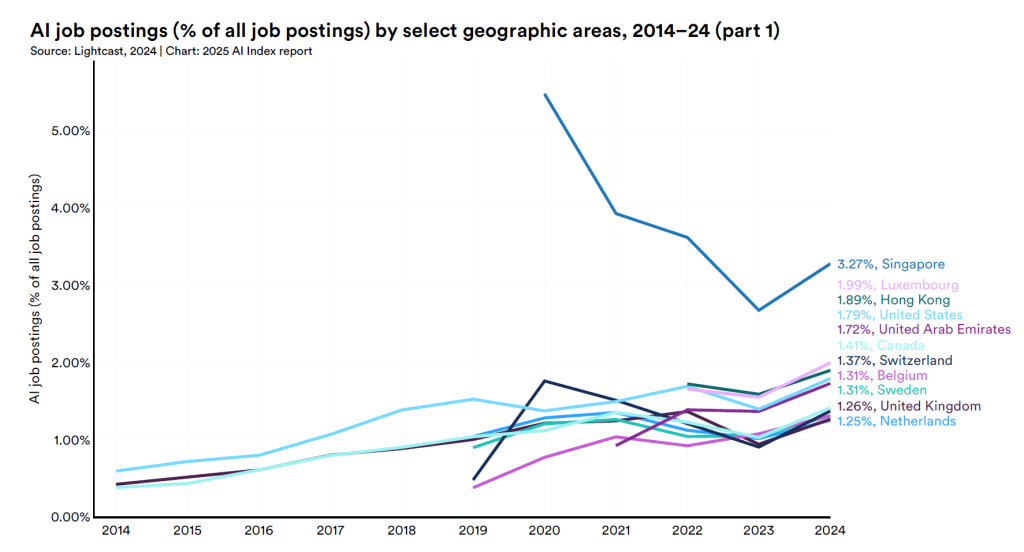NTU beats NUS, Harvard & Oxford to rank 3rd globally in AI

Disclaimer: Unless otherwise stated, opinions expressed below belong solely to the author. Data were collected from the cited third-party sources.
While I’ve already reported on the QS Top University ranking, I wanted to revisit one particular detail that is especially relevant in today’s job market: artificial intelligence (AI) and Singapore’s position in it, starting with higher education.
National University of Singapore may be ranked higher than NTU overall—8th globally vs. 12th—but in some subjects, the latter came out on top. And one of them is Data Science & Artificial Intelligence.

It came in 5th overall (vs. NUS’ 7th) and 3rd in Academic Reputation and H-index scores—the measures of pure academic performance.
| Rank | Institution | Academic Reputation | H-index Score |
| 1 | Carnegie Mellon University | 100.0 | 100.0 |
| 2 | Massachusetts Institute of Technology (MIT) | 96.9 | 100.0 |
| 3 | Nanyang Technological University, Singapore (NTU) | 90.4 | 99.8 |
| 4 | University of California, Berkeley (UCB) | 89.5 | 98.9 |
| 5 | University of Oxford | 87.7 | 95.2 |
| 6 | ETH Zurich – Swiss Federal Institute of Technology | 86.0 | 94.8 |
| 7 | Yale University | 86.0 | 78.2 |
| 8 | Harvard University | 85.9 | 94.4 |
| 9 | National University of Singapore (NUS) | 82.7 | 98.4 |
| 10 | University of Toronto | 81.3 | 90.2 |
I’ve decided to separate this table from the general ranking to focus on the essential educational scores, as the main lists take into account other metrics, such as Employer Reputation, which cost NTU a few points as it is, perhaps, not as strong a brand as some of its competitors.
Both “reputation” metrics are sourced by QS from surveys of thousands of academics and employers who are requested to give their views on the importance and excellence of work of a particular school.
Meanwhile, the H-index is used to measure both the quality and quantity of its research output (that is the number of papers and the number of citations of those papers).
As you can see, NTU comes in 3rd behind MIT and Carnegie Mellon (which is considered the birthplace of AI). You could hardly hope for a higher rank given the direct competitors. Meanwhile, NUS drops to 9th in terms of academic reputation in the subject, although it still ranks 5th in terms of sheer output.
NUS offers a better career—at least early on
Both NUS and NTU have made real strides in Data Science & AI in the past two years, rising from positions outside of the Top 10 to near the top. However, NUS enjoys a somewhat better brand than NTU, and it seems to show in Graduate Employment Surveys, which measure the job market performance of their graduates.
While NUS has only just introduced the Bachelor of Computing in Artificial Intelligence course, so we’re going to have to wait for four full years to see the employment outcomes, we can use data from related degrees to gauge the difference between the two.
Employment rates and salaries of graduates by bachelor’s degrees (within six months of graduation):
| Employed | In Full-Time Permanent Employment | Median Salary | |
| NTU | |||
| BoC in Computer Science | 82.0% | 79.6% | S$5,500 |
| BoC in Data Science and Artificial Intelligence | 84.0% | 76.0% | S$5,450 |
| NUS | |||
| BoC in Computer Science | 89.1% | 87.8% | S$6,500 |
| BoC in Artificial Intelligence | TBD | TBD | TBD |
International rankings in Computer Science are 4th for NUS and 6th for NTU, so the gap between them, again, isn’t huge. And in terms of academic performance, they are quite evenly matched.
And yet, graduates from NUS not only enjoy much higher employment rates (especially for permanent roles after graduation) but are also, on average, paid S$1,000 more each month (the salary figures exclude employer CPF, bonuses, etc., and are based solely on the basic gross salary).
It stands to reason, then, that the situation for AI graduates may be quite similar, despite the fact that NTU has been running its bachelor’s course since 2018—unless it finally gets the recognition it deserves according to the QS ranking and closes the gap with its older sibling.
Six-figure salaries for AI engineers in Singapore
While we don’t have specific data on employment outcomes of graduates of each respective school further down their careers (as it would be hard to do for AI given how it is still growing quickly), it seems fair to assume that the importance of the degree wanes with time, replaced with actual job experience.
And engineers in Machine Learning, Artificial Intelligence or Data Science can expect excellent pay in Singapore.
According to Indeed, the average basic salary for an AI/ML Engineer in Singapore is around S$83,000 per year, similar to what Glassdoor reports. Morgan McKinley has it at S$90,000 to S$170,000, going up to S$240,000 for more experienced and senior candidates.
Another bit of good news is the findings from Stanford’s AI Index Report, which show that there should be no shortage of jobs for AI professionals in Singapore, as it leads the world in the proportion of AI-related job listings.
Roughly one in 30 offers is looking for candidates with AI skills:

So, which should you choose? A slightly more mature and academically respected NTU? Or the new course at NUS, which is likely to offer a better career start in terms of employment and money?
It ultimately depends on your goals. If your passion is research or science, then the academic reputation might sway you towards the school with the better output. But if you see yourself working in the private sector, then it’s likely that the differences between them are not enough to be a big deal in the workplace, and the NUS badge might give you a better head start.
Then again, both schools are so closely matched that it may be pointless to nitpick. We can only wish NTU improves recognition among employers, so that its graduates can enjoy an equal start with their peers from NUS.
Academically, both are excellent choices, recognised among the very best in the world.
- Read other articles we’ve written on Singapore’s current affairs here.
Featured Image Credit: postmodernstudio/ depositphotos






